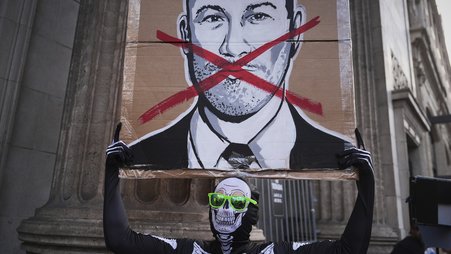We’re not your lawyers and this article isn’t legal advice. Talk to your attorney before taking any legal action.
Some say President Donald Trump runs the country like a business. That’s debatable, though he certainly treats the press like one of his corporate rivals – including by targeting news outlets with legal actions that are normally seen in business litigation. The claims are baseless. But they may open up opportunities for the press to go on offense.
Case in point, Trump recently took to his platform Truth Social to accuse The New York Times of “tortious interference,” a legal theory usually employed when one company undermines another’s contractual or business relationships. His reasoning? The Times cited experts who doubted the strength of his lawsuit against CBS for editing an interview with presidential rival Kamala Harris.
At risk of reading too much into Trump’s ramblings, he may have been accusing the Times of interfering with his expected settlement with CBS, which is reportedly afraid he’ll block its parent Paramount’s merger plans with media company Skydance if it doesn’t pay up. He also alluded to election interference, but that makes even less sense — the Times article ran five months after the election (and, of course, news reporting is not election interference).
That lawsuit against CBS doubles down on business litigation theories by including “unfair competition” claims, premised on Trump’s assertion that Truth Social competes with CBS. Trump loyalist and “special government employee” Elon Musk has similarly said his social media site, X, is a competitor of traditional media outlets. Both Trump and Musk have also sued news outlets and publishers under consumer fraud and deceptive business practices laws.
To state the obvious, news outlets cannot be held liable for citing legal experts or editing interviews. The Supreme Court has made clear that First Amendment protections can’t be circumvented by repackaging lawsuits aimed at punishing journalism under creative legal theories.
But the Constitution does not extend the same protections to malicious smear campaigns to harm business competitors. Routine hyperbole and exaggeration are not actionable (for example, “My car dealership is the best in town”), but verifiable lies to undermine competitors sure are (for example, “The car dealership across the street falsifies accident records to sell lemons”). So are other deceptive antics to undermine corporate rivals (“Hey carmaker, that’s a nice retailer agreement you’ve got with my dealership — wouldn’t want something to happen to it if you sell cars to that other place too”).
And that is exactly what Trump is up to — not just in his capacity as president, but in his capacity as majority shareholder of Trump Media & Technology Group Corp., owner of Truth Social. When he lies about Reuters and Politico receiving improper payments from the government, including misrepresenting contracts his administration signed with a Reuters business unrelated to its newsroom, he’s damaging Truth Social’s competition. Same goes for Musk and X.
Trump is not only retaliating against news outlets that don’t do his bidding, he’s abusing his office to boost his business interests
When Trump sics Federal Communications Commission Chair Brendan Carr on news broadcasters to baselessly threaten their licenses, or when he denies access to The Associated Press and other wire services that he sees as competition, he’s not only retaliating against news outlets that don’t do his bidding, he’s abusing his office to boost his business interests.
The potential legal theories against Trump, Musk, and their companies aren’t perfect. Trump’s mixed motives — anticompetitiveness as an entrepreneur, on the one hand, and censorship as an authoritarian on the other — complicate things, particularly given the legal immunity he enjoys and abuses.
But Truth Social and X aren’t immune, and neither is Trump, to the extent he was acting as a businessperson rather than a sitting president. It would sure be interesting to take discovery to find out what his real agenda is. Remember, Trump has long dreamed of starting his own media empire.
And whatever flaws the legal claims against Trump and his holdings may have, they’re a whole lot stronger than the nonsense lawsuits Trump pursues to shake down the press.
One problem is that many potential claims, like one for tortious interference, would need to be brought by a media outlet Trump targets. The same corporations caving to Trump probably won’t sue him. That’s unfortunate — principles aside, Trump has already shown that bending the knee doesn’t work. After ABC capitulated, he came after it again. It’s time to try a different approach.
But even if media companies don’t grow some courage, there could be avenues for others to sue. Unfair competition, and consumer fraud and deceptive business practices claims, depending on state law, may be available to impacted consumers, not just competing businesses. For example, a news publisher or reader who relied on the AP’s dispatches to their local newspaper until Trump banned his competitor may have remedies. So might someone (or a class of people) who wasted money on premium subscriptions to X based on Musk’s lies about his competition.
State attorneys general and other local authorities may be able to act as well. Texas Attorney General Ken Paxton launched an investigation into Media Matters for allegedly deceiving Texas consumers about hate speech on X. Paxton’s legal claims were unserious. Media Matters didn’t publish anything false. It’s also not a competitor of X and has never claimed to be.
But that doesn’t mean similar legal theories can’t succeed under different circumstances — like an actual self-proclaimed competitor of news outlets trying to sink their businesses with lies. Back in 2016, Trump settled a lawsuit alleging deceptive business practices (among other things) by then-New York Attorney General Eric Schneiderman over Trump University’s shenanigans.
Yes, bringing these kinds of claims in cases involving the press could backfire by validating legal claims that could come back to bite journalists. That’s a legitimate concern, although the flip side is that they could force Trump and Musk to argue for limited readings of laws they’ve previously weaponized. But good lawyers should be able to navigate those minefields.
This is not a new problem — courts have long punished deceptive commercial speech while managing to distinguish it from journalism, political debate, and other constitutionally protected speech. As a completely random example, no one would suggest the First Amendment protects someone, say, hawking watches made in China and falsely marketing them as from Switzerland because it’s “free speech.”
Regardless, we’re living in unprecedented times and need to take more risks than we might prefer under normal circumstances. That doesn’t mean be reckless, but we can’t let hypothetical concerns about adverse precedents around the margins of constitutional law stop us from fighting back against someone who wants to destroy the First Amendment, full stop. If we pull punches in hopes of fighting another day, there might not be one.





